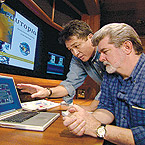 Far from innovative but quite consequential, we're on the verge of initiating a laptop program for teachers.
Far from innovative but quite consequential, we're on the verge of initiating a laptop program for teachers.
Laptops-for-teacher initiatives have been around for a long time and are common in many school districts. For us, a 1000-student, 2-school, K-8 district, this is a big step as we move forward with efforts to make technology an increasingly essential - and transparent - component of student's day-to-day lives at school.
Why is a laptops-for-teachers program such an important first step if we're going to truly become a 21st Century school district, one that can confidently say is preparing kids for their futures, not our pasts?
First, consider the digital native-digital immigrant distinction (as described by Marc Prensky in 2001) and the Beloit College Mindset List, which annually posts what everyday life is like for those heading off to their freshman year of college. It's still remarkable - especially to digital immigrants - how many technologies are taken for granted by digital natives. It's obvious that mobile phones, computers, cameras/camcorders and other technologies are a basic part of everyday life for young people. Even digital immigrants, who had productive lives before www.everything, played vinyl disks on record players, had cars with AM-only radios, watched B&W TVs with "rabbit ears", remember Saturday mornings as cartoon nirvana and walked uphill to and from school through knee deep snow, have made many adjustments - who doesn't have a mobile phone and at least one email account?
It turns out that teaching with technology is different that using technology in everyday life. That's a gross oversimplification of the obvious. What can we do about it? What does it take to enable the power of today's (and tomorrow's) technology tools in our classrooms?
One way to facilitate this change is to change the way teachers think about and use technology (and by technology, I mean computers, software, the web and basic audio-visual input devices like cameras and camcorders). By providing teachers with school district-owned laptops, teachers have access to these technologies at school and at home, and have a support structure in place to help with maintenace and "how to" training.
Another fundamental component of this change process is critical mass i.e. some base number and distribution of teachers using the same tools for the same purpose. Once you reach critical mass with some education-related technologies (computers, interactive whiteboards, etc.), teachers can start relying more on each other for support and learning and less on others (technology-learning specialists, library-media specialists, etc.).
We'll pick up on this next time.


